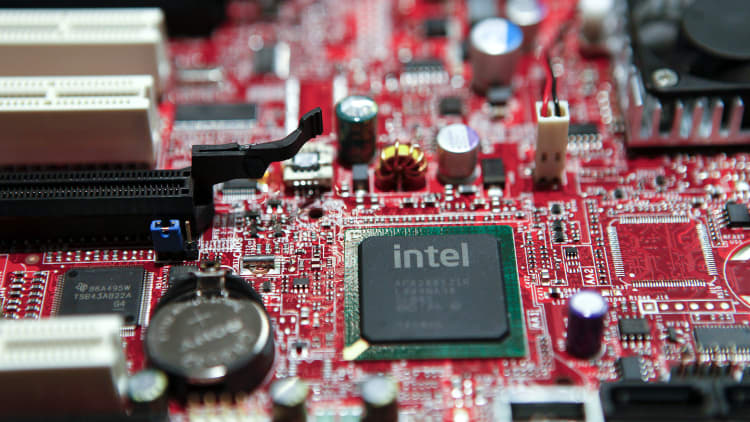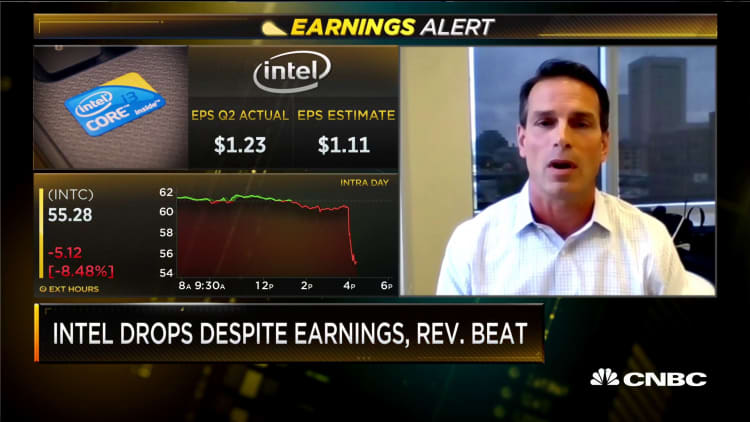
Intel shares fell as much as 10% in extended trading on Thursday after the company reported better-than-expected second-quarter earnings and said next-generation chips would come out later than it had expected.
Here's how the company did:
- Earnings: $1.23 per share, adjusted, vs. $1.11 per share as expected by analysts, according to Refinitiv.
- Revenue: $19.73 billion, vs. $18.55 billion as expected by analysts, according to Refinitiv.
With respect to guidance, Intel called for $1.10 in earnings per share on an adjusted basis and $18.2 billion in revenue for its fiscal third quarter. Analysts polled by Refinitiv had expected $1.14 in adjusted earnings per share on $17.90 billion in revenue.
One quarter ago Intel chose not to give full-year guidance, but on Thursday it announced a new forecast for the full year. It now sees $4.85 in adjusted earnings per share and $75 billion in revenue — implying 4% growth — compared with the $5 in adjusted earnings per share and $73.5 billion in revenue announced in January. The consensus among analysts polled by Refinitiv was $4.81 in adjusted earnings per share and revenue of $73.86 billion.
The company announced delays to the release of chips sporting tiny 7-nanometer transistors for higher performance as it seeks to catch up with AMD, which already has 7-nanometer products available. Intel discovered an issue in the 7-nanometer manufacturing process that caused lower yields of flawless chips. Last year Intel executives said 7-nanometer chips would launch in 2021, and that came after a delay of Intel's 10-nanometer products. Now the company is ramping up production of 10-nanometer chips to meet demand for those products, rather than older products.
"The company's 7nm-based CPU product timing is shifting approximately six months relative to prior expectations," the company said in a statement. "The primary driver is the yield of Intel's 7nm process, which based on recent data, is now trending approximately 12 months behind the company's internal target."
Intel now plans to make its first 7-nanometer chip shipments in late 2022 or early 2023, CEO Bob Swan said on a conference call with analysts on Thursday.
"We will continue to invest in our future process technology roadmap but we will be pragmatic and objective in deploying the process technology that delivers the most predictability and performance for our customers, whether that be on our process, external foundry process, or a combination of both," Swan said.
AMD stock rose 8% after hours following Intel's announcement.
The struggle to bring out competitive chips comes after Intel ran into supply issues, which in turn affected device makers such as Dell and HP.
Intel's revenue increased 20% year over year for the quarter that ended on June 27, compared with 23% growth one quarter earlier, Intel said.
Intel's top business unit, the Client Computing Group that makes chips for PCs, delivered $9.50 billion in revenue in the quarter, growing 7% on an annualized basis and topping the FactSet consensus estimate of $9.10 billion. Industry research group Gartner estimated that second-quarter PC shipments returned to year-over-year growth in the quarter, after a decline in the first quarter in connection with the pandemic.
The Data Center Group, which focuses on chips for cloud providers and server makers, contributed $7.12 billion in revenue, up 43% and above the $6.61 billion FactSet consensus.
The Non-Volatile Memory Solutions Group had $1.66 billion in revenue, representing 76% growth and coming in higher than the $1.29 billion consensus.
In the quarter Intel announced the $900 million acquisition of mobility start-up Moovit and the $150 million sale of its home gateway platform business to MaxLinear. It also introduced new chips for gaming PCs and laptops.
Before the stock move, Intel shares had risen about 1% since the start of the year, while the S&P 500 was flat.
Correction: This article originally included Intel's quarterly earnings per share, rather than adjusted earnings per share.
WATCH: Edgewater Research analyst says Intel will be more competitive than AMD in 2021



